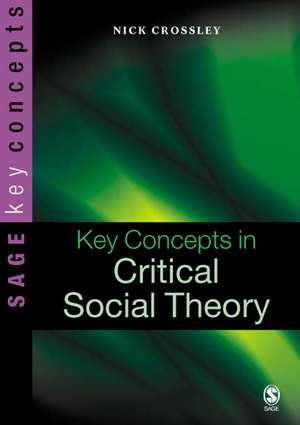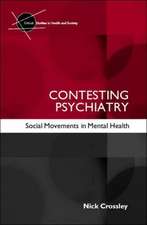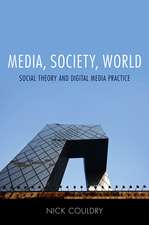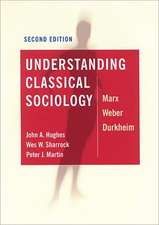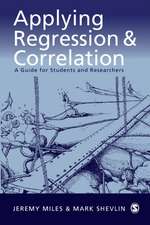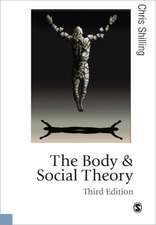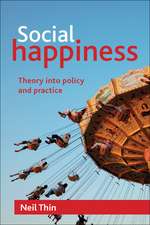Key Concepts in Critical Social Theory: SAGE Key Concepts series
Autor Nick Crossleyen Limba Engleză Paperback – 17 dec 2004
- Larry Ray, Professor of Sociology, University of KentThe SAGE Key Concepts series provides students with accessible and authoritative knowledge of the essential topics in a variety of disciplines. Cross-referenced throughout, the format encourages critical evaluation through understanding. Written by experienced and respected academics, the books are indispensable study aids and guides to comprehension.
Key Concepts in Critical Social Theory:
- Provides brief accounts of the central ideas behind the key concepts
- Prepares students to tackle primary texts, giving them a point of reference when they find themselves stuck
- Discusses each concept in an introductory way
- Offers further reading guidance for independent learning.
| Toate formatele și edițiile | Preț | Express |
|---|---|---|
| Paperback (1) | 441.30 lei 6-8 săpt. | |
| SAGE Publications – 17 dec 2004 | 441.30 lei 6-8 săpt. | |
| Hardback (1) | 1314.17 lei 6-8 săpt. | |
| SAGE Publications – 8 dec 2004 | 1314.17 lei 6-8 săpt. |
Din seria SAGE Key Concepts series
-
 Preț: 294.92 lei
Preț: 294.92 lei -
 Preț: 323.44 lei
Preț: 323.44 lei -
 Preț: 286.66 lei
Preț: 286.66 lei - 5%
 Preț: 231.72 lei
Preț: 231.72 lei -
 Preț: 287.15 lei
Preț: 287.15 lei -
 Preț: 306.20 lei
Preț: 306.20 lei - 5%
 Preț: 308.55 lei
Preț: 308.55 lei -
 Preț: 274.22 lei
Preț: 274.22 lei -
 Preț: 267.70 lei
Preț: 267.70 lei -
 Preț: 244.94 lei
Preț: 244.94 lei -
 Preț: 280.33 lei
Preț: 280.33 lei -
 Preț: 279.42 lei
Preț: 279.42 lei -
 Preț: 263.29 lei
Preț: 263.29 lei -
 Preț: 275.45 lei
Preț: 275.45 lei -
 Preț: 341.31 lei
Preț: 341.31 lei -
 Preț: 315.20 lei
Preț: 315.20 lei -
 Preț: 315.76 lei
Preț: 315.76 lei -
 Preț: 272.41 lei
Preț: 272.41 lei -
 Preț: 267.42 lei
Preț: 267.42 lei -
 Preț: 280.08 lei
Preț: 280.08 lei -
 Preț: 411.33 lei
Preț: 411.33 lei -
 Preț: 437.50 lei
Preț: 437.50 lei - 18%
 Preț: 925.62 lei
Preț: 925.62 lei -
 Preț: 369.84 lei
Preț: 369.84 lei - 19%
 Preț: 405.98 lei
Preț: 405.98 lei - 18%
 Preț: 1163.02 lei
Preț: 1163.02 lei -
 Preț: 322.89 lei
Preț: 322.89 lei -
 Preț: 436.13 lei
Preț: 436.13 lei -
 Preț: 315.47 lei
Preț: 315.47 lei - 15%
 Preț: 439.61 lei
Preț: 439.61 lei - 18%
 Preț: 968.39 lei
Preț: 968.39 lei -
 Preț: 275.45 lei
Preț: 275.45 lei -
 Preț: 429.50 lei
Preț: 429.50 lei -
 Preț: 482.24 lei
Preț: 482.24 lei - 18%
 Preț: 1011.92 lei
Preț: 1011.92 lei -
 Preț: 452.31 lei
Preț: 452.31 lei - 5%
 Preț: 426.48 lei
Preț: 426.48 lei - 5%
 Preț: 386.06 lei
Preț: 386.06 lei -
 Preț: 417.86 lei
Preț: 417.86 lei -
 Preț: 440.00 lei
Preț: 440.00 lei - 5%
 Preț: 1122.48 lei
Preț: 1122.48 lei - 15%
 Preț: 466.68 lei
Preț: 466.68 lei
Preț: 441.30 lei
Preț vechi: 495.85 lei
-11% Nou
Puncte Express: 662
Preț estimativ în valută:
84.45€ • 91.70$ • 70.94£
84.45€ • 91.70$ • 70.94£
Carte tipărită la comandă
Livrare economică 22 aprilie-06 mai
Preluare comenzi: 021 569.72.76
Specificații
ISBN-13: 9780761970606
ISBN-10: 0761970606
Pagini: 352
Ilustrații: 1, black & white illustrations
Dimensiuni: 148 x 210 x 23 mm
Greutate: 0.48 kg
Ediția:First Edition
Editura: SAGE Publications
Colecția Sage Publications Ltd
Seria SAGE Key Concepts series
Locul publicării:London, United Kingdom
ISBN-10: 0761970606
Pagini: 352
Ilustrații: 1, black & white illustrations
Dimensiuni: 148 x 210 x 23 mm
Greutate: 0.48 kg
Ediția:First Edition
Editura: SAGE Publications
Colecția Sage Publications Ltd
Seria SAGE Key Concepts series
Locul publicării:London, United Kingdom
Recenzii
"Each entry is written with keen insight and clarity, often locating concepts in relation to one another and to their origins in classical philosophy. The bottom line: Crossley's book offers valuable discussions that make it extremely useful for anyone interested in social theory. . . . Highly recommended."
"Nick Crossley's Key Concepts in Critical Social Theory is a useful reference tool for undergraduates of all majors trying to navigate the complexities of sociological theory. Key Concepts may also be useful for graduate students reviewing sociology basics for early graduate courses and later when preparing for comprehensive exams in sociological theory."
"Nick Crossley's Key Concepts in Critical Social Theory is a useful reference tool for undergraduates of all majors trying to navigate the complexities of sociological theory. Key Concepts may also be useful for graduate students reviewing sociology basics for early graduate courses and later when preparing for comprehensive exams in sociological theory."
Cuprins
Alienation
Alienation
Anomie
Body-Subject
Body-Power/Bio-Power
Capital (in the work of Pierre Bourdieu)
Citizenship
Colonization of the Lifeworld
Crisis
Cycles of Contention
Deconstruction
Discourse
Discourse Ethics
Doxa
Epistemological Break
Field
Freedom
Globalization
Habitus
Hegemony
Hexis/Body Techniques
Humanism and Anti-Humanism
Hybridity
I and Me
Id, Ego and Superego
Ideal Speech Situation
Identity (personal, social, collective and 'the politics of')
Ideology
Illusio
Imaginary, Symbolic and Real
Intersubjectivity
Knowledge Constitutive Interests
Lifeworld
Mirror Stage and the Ego
New Social Movements
Orientalism
Patriarchy
Performativity
Power
Power/Knowledge
Public Sphere
Racism(s) and Ethnicity
Rationality
Realism
Recognition (desire and struggle for)
Relationalsim (versus Substantialism)
Repertoires of Contention
Repression (Psychoanalysis)
Sex/Gender Distinction
Social Capital
Social Class
Social Constructions/Constructionism
Social Movements
Social Space I (Bourdieu)
Social Space II (Networks)
Symbolic Power/Symbolic Violence
System and Lifeworld
Unconscious (The)
Alienation
Anomie
Body-Subject
Body-Power/Bio-Power
Capital (in the work of Pierre Bourdieu)
Citizenship
Colonization of the Lifeworld
Crisis
Cycles of Contention
Deconstruction
Discourse
Discourse Ethics
Doxa
Epistemological Break
Field
Freedom
Globalization
Habitus
Hegemony
Hexis/Body Techniques
Humanism and Anti-Humanism
Hybridity
I and Me
Id, Ego and Superego
Ideal Speech Situation
Identity (personal, social, collective and 'the politics of')
Ideology
Illusio
Imaginary, Symbolic and Real
Intersubjectivity
Knowledge Constitutive Interests
Lifeworld
Mirror Stage and the Ego
New Social Movements
Orientalism
Patriarchy
Performativity
Power
Power/Knowledge
Public Sphere
Racism(s) and Ethnicity
Rationality
Realism
Recognition (desire and struggle for)
Relationalsim (versus Substantialism)
Repertoires of Contention
Repression (Psychoanalysis)
Sex/Gender Distinction
Social Capital
Social Class
Social Constructions/Constructionism
Social Movements
Social Space I (Bourdieu)
Social Space II (Networks)
Symbolic Power/Symbolic Violence
System and Lifeworld
Unconscious (The)
Notă biografică
Nick Crossley Senior Lectuer in Sociology, University of Manchester
Descriere
•Provides brief accounts of the central ideas behind key concepts of critical social theory
•Prepares students to tackle primary texts and gives them a point of reference when they find themselves stuck
•Is essential reading for undergraduates in sociology and across the social sciences.
•Is essential reading for undergraduates in sociology and across the social sciences.
